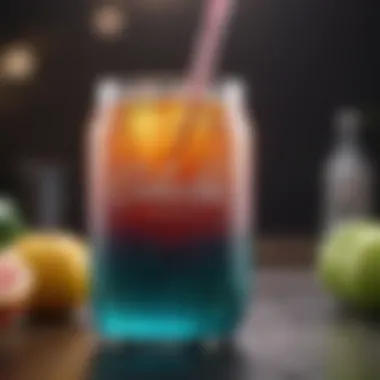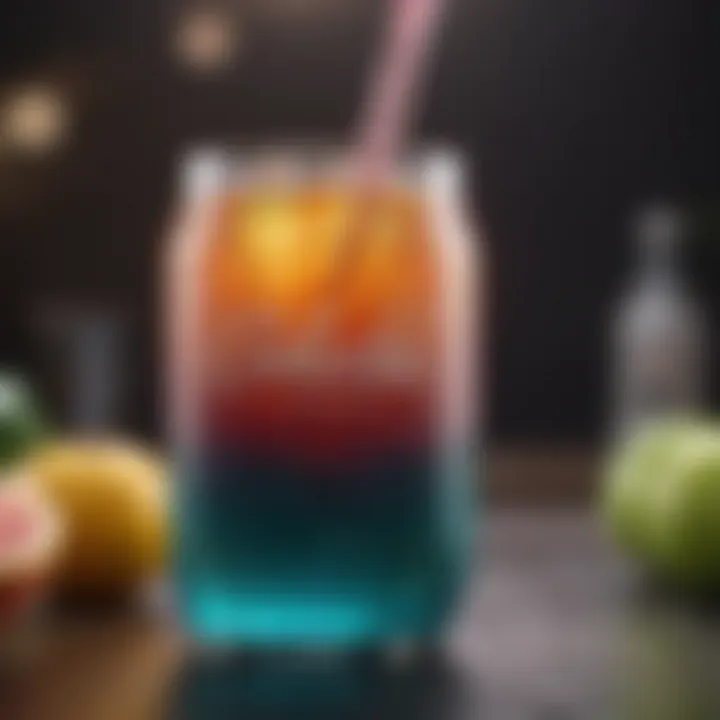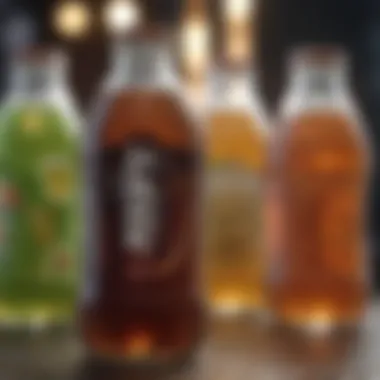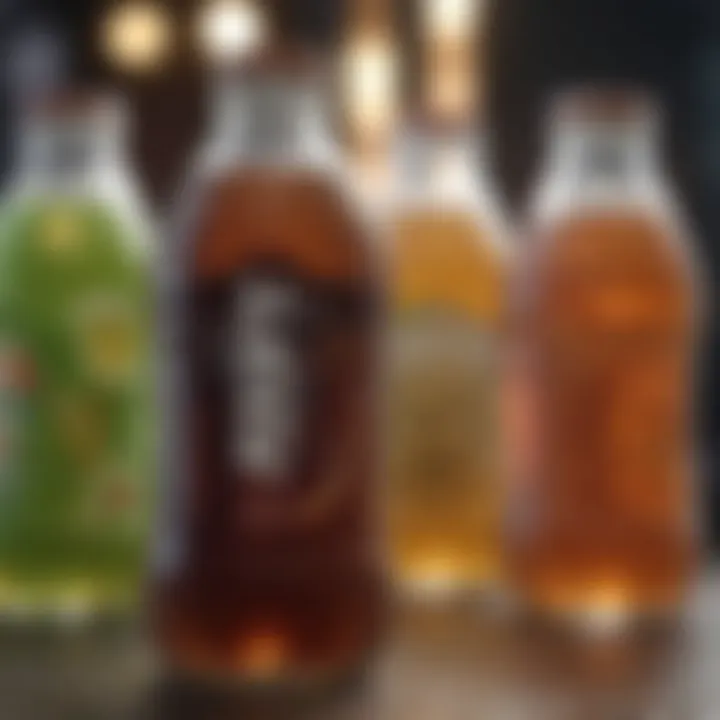Discovering Low Carb Soda Alternatives for Healthier Choices


Intro
The rise in popularity of low carb diets has led to a surge in demand for alternatives to traditional soda. Comprised mainly of sugar and empty calories, regular soda can have negative impacts on physical health. People seeking to minimize carbohydrate intake often find themselves searching for refreshing options that do not compromise taste. This article will investigate various low carb soda alternatives, offering insights into their benefits, taste profiles, and market trends. It will serve as a practical guide for health-conscious individuals aiming for healthier beverage choices while still enjoying fizzy drinks.
Key Benefits
Physical Health Benefits
Choosing low carb soda alternatives can significantly boost one’s health. Many of these beverages contain fewer calories and avoid the detrimental effects of high sugar content. This can support weight management and lead to reduced risks of chronic diseases. Common alternatives often utilize natural sweeteners like stevia or erythritol, which add sweetness without the associated sugars.
In addition to calorie reduction, many low carb products are also crafted to include beneficial ingredients like vitamins or minerals. For instance, some drinks incorporate electrolytes which can aid in hydration and replenishment.
Mental Well-being Enhancements
The impact of nutrition on mental health is becoming increasingly acknowledged. When individuals switch to low carb soda alternatives, they may experience an improvement in mood stability. This is partly due to stabilized blood sugar levels, which can prevent the mood swings associated with sugar crashes from traditional soda.
Moreover, a conscious consideration of beverage ingredients fosters a better relationship with food choices. This mindfulness may enhance overall well-being and promote healthier habits over time.
Practical Tips
Effective Meal Planning
Incorporating low carb sodas into meal planning can be straightforward. Consider pairing them with meals that complement their flavors, such as grilled chicken or salads. This can help create balanced meals with proper hydration. It is also beneficial to prepare a selection of drinks in advance to ensure availability at mealtime.
Choosing the Right Alternatives
As more brands enter the low carb market, it is vital to make informed choices. Reading labels for ingredient transparency becomes crucial. Here are some tips to select the right alternatives:
- Check for Sweeteners: Opt for those that use natural sweeteners, avoiding artificial options when possible.
- Ingredient Lists: Look for products with recognizable ingredients, reflecting a commitment to quality and health.
- Taste Testing: Personal preferences vary, so sampling several options can identify flavors that appeal most.
"Understanding what goes into your drink can empower you to make better choices for your health."
By focusing on tasty, low carb alternatives, individuals can continue to enjoy fizz while also improving their overall health. This exploration aims to not only inform but also inspire healthier living amidst a myriad of beverage choices.
Understanding Low Carb Beverages
Low carb beverages have gained much attention in recent years due to an increase in health awareness and dietary considerations. This section aims to illuminate the concept of low carb sodas and underscore their relevance among contemporary drink options. Understanding low carb beverages is essential for those pursuing a healthier lifestyle while still desiring flavorful choices in their diets.
Defining Low Carb Sodas
Low carb sodas are beverages that contain significantly reduced amounts of carbohydrates, often equating to lower sugar content. Usually, these beverages provide a satisfying taste without contributing to excessive calorie intake. Many traditional sodas are high in sugar, which can lead to various health issues like obesity and type 2 diabetes. Conversely, low carb sodas use alternative sweeteners, such as stevia or erythritol, to maintain sweetness without impacting blood sugar levels. This distinction makes them an appealing option for individuals monitoring their carbohydrate intake.
Importance of Low Carb Alternatives
The importance of low carb alternatives lies in their capability to cater to different dietary needs while offering consumers flavorful options. Incorporating low carb sodas into one’s diet may help in maintaining energy levels and satisfying thirst without the risk of blood sugar spikes. Additionally, as more individuals become aware of sugar’s negative health effects, low carb sodas fulfill a vital role in promoting healthier drinking habits. Some key reasons to consider low carb alternatives include:
- Reduced risk of obesity: Lower sugar consumption helps in managing weight.
- Better blood sugar control: Less impact on insulin levels fosters a more stable energy supply.
- Catering to special diets: Suitable for low carb, ketogenic, or diabetic diets.
Adopting low carb beverages is not merely about reducing sugars. It represents a significant choice towards mindful eating and drinking practices. By choosing low carb alternatives, individuals can align their beverage choices with their broader health goals.


The Health Perspective
Understanding the health implications of low carb soda alternatives is essential for those who prioritize their wellbeing. The frequent consumption of traditional sodas often leads to various health concerns, prompting a shift towards healthier options. This section discusses how traditional sodas affect health, the benefits of reducing sugar intake, and the potential risks associated with artificial sweeteners. Each of these elements plays a significant role in promoting informed choices.
Effects of Traditional Sodas
Traditional sodas are well-known for their high sugar content. A single can often contains upwards of 40 grams of sugar. This excessive intake can lead to a host of health problems, including obesity, type 2 diabetes, and heart disease. Moreover, there is evidence linking sugary drinks to increased dental issues such as cavities and erosion of tooth enamel. Sugar also interacts with the body’s metabolism, potentially causing spikes in insulin levels. This can lead to cravings for more sugary foods and contribute to a vicious cycle of unhealthy eating.
In addition to sugar, many traditional sodas contain caffeine and phosphoric acid. Caffeine, while it can provide temporary energy, may lead to increased anxiety and sleep disturbances in some individuals. Phosphoric acid, commonly found in colas, may impact bone health over time by interfering with calcium absorption. These factors combined suggest that reducing intake of traditional sodas is necessary for long-term health.
Benefits of Reducing Sugar Intake
Cutting back on sugar brings numerous health benefits. Firstly, it aids in weight management. As the body receives fewer calories from sugars, it can lead to a decrease in body fat percentage. This not only enhances physical appearance but significantly boosts overall health. Research shows that lower sugar consumption can also reduce the risk of chronic diseases like heart disease and diabetes. When people consume fewer sugary drinks, they often seek healthier alternatives, leading to a more balanced diet.
Additionally, reducing sugar helps to stabilize blood sugar levels. This can lead to improved energy levels and decrease mood swings associated with sugar crashes. For individuals looking to enhance their cognitive function, less sugar can result in better concentration and focus. Importantly, less sugar consumption also has a positive impact on dental health by reducing the risk of cavities.
Potential Risks of Artificial Sweeteners
While artificial sweeteners provide a low-calorie solution for those looking to cut sugar, they are not without their criticisms. Some studies suggest that certain sweeteners, like aspartame and sucralose, can lead to digestive issues for some individuals. Furthermore, the long-term effects of consuming artificial sweeteners remain a topic of ongoing research. There are concerns that the use of these sweeteners may interfere with the body’s natural ability to regulate calorie intake, leading individuals to possibly consume more calories from other sources.
Moreover, some studies have linked the consumption of artificial sweeteners to negative health outcomes, including potential impacts on gut health and even increased cravings for sweetness, which may inadvertently lead to greater sugar consumption. As health professionals advise, understanding individual reactions to these sweeteners is critical in making informed dietary choices.
Natural Low Carb Soda Alternatives
Natural low carb soda alternatives serve as a significant topic in the beverage industry today. Many people are shifting their focus to healthier options. This change is driven by an increasing awareness of the health implications surrounding traditional sodas, which are often loaded with sugar and artificial ingredients. Low carb alternatives cater to this need. They offer a way to enjoy fizzy beverages without excessive calories or sugar. Another important point is the growing demand for natural ingredients. Consumers are more health-conscious and prefer options free from artificial additives. This section will delve into some popular natural low carb soda alternatives, emphasizing their benefits and considerations for those in pursuit of healthier lifestyles.
Sparkling Water: A Healthy Substitute
Sparkling water has emerged as a leading alternative to traditional sodas. It is essentially water that has been carbonated, giving it that refreshing fizz without the calories associated with regular soft drinks.
Flavored Sparkling Water Options
Flavored sparkling water presents a tasteful twist on the classic carbonated drink. Brands are increasingly offering a wide variety of flavors, such as lemon, lime, berry, and even exotic options like mango or hibiscus. These beverages are appealing because they can deliver flavor without the calories and sugar found in many sodas. One key characteristic of flavored sparkling water is the use of natural essences or extracts rather than added sugars. This makes it a beneficial choice for those looking to enjoy a refreshing beverage without contributing to their daily sugar intake. However, one should check ingredients, as some flavored varieties may still contain sweeteners or added calories, which could counteract their low carb appeal.
Plain vs. Flavored Varieties
The choice between plain and flavored sparkling water also deserves attention. Plain sparkling water is a versatile option that can be enjoyed on its own or used as a base for various drinks. Flavored versions, on the other hand, offer immediate taste enhancement. The plain variant is a popular choice for those who want to avoid any added flavors or artificial ingredients. It allows for flexible usage, like mixing with fresh fruits or herbs. Flavored sparkling water provides instant gratification, but one must weigh the potential for added ingredients that can reduce its health benefits. Finding the right balance between preference and health considerations is essential.
Kombucha: The Fermented Beverage
Kombucha, a fermented tea beverage, is gaining traction as a low carb soda alternative. It is created through the fermentation process involving specific strains of bacteria and yeast. This unique brewing method contributes to its distinct flavor and probiotic content.
Health Benefits of Kombucha
The health benefits of kombucha are noteworthy. The beverage is often praised for its probiotic properties, potentially aiding digestion and supporting gut health. Additionally, kombucha contains antioxidants that can help combat oxidative stress, which is relevant to overall health. Its natural fermentation process means it tends to have lower sugar content than traditional sodas. This makes it appealing for those seeking healthier drink options. However, some commercially available kombucha may still contain higher sugar levels, which could be a concern for low-carb dieters. Consumers are encouraged to read labels carefully.
Low Carb Kombucha Brands
Several brands are now catering specifically to the low carb market by producing kombucha that adheres to minimal sugar content. Some notable examples include Health-Ade and GT's Kombucha, which produce varieties with low sugar content while still retaining the probiotic benefits. Choosing low carb kombucha helps to maintain a balance between enjoying the health benefits of kombucha while adhering to dietary goals. However, consumers should always investigate individual products, as formulations can vary significantly between brands.
Commercial Low Carb Soda Options


In today's health-conscious market, commercial low carb sodas have emerged as an important category of beverages. These alternatives to traditional sugary drinks are designed to satisfy cravings for sweetness and carbonation without the added sugars that contribute to various health issues. Consumers are increasingly aware of the impact of sugar on their health, prompting a search for better beverage choices. Those who are following low carb or ketogenic diets benefit substantially from these options.
Low carb sodas not only provide a satisfying experience in terms of flavor and fizz, but they also allow individuals to maintain low sugar and caloric intake. They typically use alternative sweeteners that do not spike blood sugar levels, making them suitable for people with diabetes or anyone aiming for weight management. Furthermore, the rise in this sector reveals a shift in consumer preferences, pushing brands to innovate and improve the quality of their offerings.
Popular Brands Overview
Brand A: Ingredient Analysis
Brand A is known for its commitment to transparency in ingredients. The formulation often includes carbonated water, natural flavors, and erythritol as a sweetener. Erythritol is a sugar alcohol that has 0 calories and does not affect blood glucose levels. This characteristic makes it a beneficial choice for those looking to reduce sugar consumption.
One unique feature of Brand A is its emphasis on natural flavors derived from fruit extracts, which provides a refreshing taste with minimal processing. However, some consumers may experience digestive issues when consuming large amounts of sugar alcohols like erythritol. This consideration is important when evaluating Brand A's suitability for sensitive individuals.
Brand B: Flavor Profile Comparison
Brand B stands out for its diverse flavor selection, appealing to a wide range of palates. This brand utilizes a combination of artificial and natural sweeteners, making its drinks both flavorful and low in calories. The key characteristic of Brand B is its ability to replicate classic soda profiles, placing strong emphasis on taste without compromising health.
A unique feature of Brand B is its collaboration with popular beverage influencers, enhancing its market visibility. This strategy has resulted in increased brand loyalty. However, some may still have concerns about artificial sweeteners, which could lead to adverse reactions for certain individuals. Therefore, it becomes crucial to evaluate personal preferences and sensitivities when opting for Brand B.
Market Trends in Low Carb Sodas
The market for low carb sodas is experiencing significant growth. Consumers are gravitating towards healthier lifestyle choices, and the demand for innovative beverage options reflects this. As a result, various brands are stepping up to reformulate their classic sodas with low or no sugar options. In addition, there is a notable trend toward using natural sweeteners, clean labeling, and promoting overall transparency in ingredient sourcing.
Furthermore, many consumers are now integrating low carb sodas into broader diets focused on wellness. The social media landscape plays a role in influencing these choices as reviews and recommendations spread quickly among health-focused communities. Monitoring these trends allows producers to stay ahead of market demands, ensuring that consumer needs are met while promoting healthier alternatives.
DIY Low Carb Soda Recipes
DIY low carb soda recipes provide an accessible and customizable approach to enjoying refreshing drinks without the sugar associated with traditional soda. These recipes allow health-conscious individuals to control the ingredients, avoiding artificial sweeteners and other additives often found in commercial options. By making beverages at home, one can experiment with flavors, ensuring that the drinks are not only low in carbs but also tailored to personal taste preferences. Additionally, creating these sodas can be a fun and rewarding activity, making it easier to stick to a low-carb lifestyle while still enjoying a variety of flavors.
Homemade Sparkling Lemonade
Ingredients Required
For homemade sparkling lemonade, the fundamental ingredients generally include fresh lemon juice, a low-carb sweetener, and sparkling water.
- Fresh Lemon Juice: This ingredient provides a natural tartness essential for the flavor profile. Fresh juice is preferable to bottled versions, which can contain preservatives and additional sugars.
- Low-Carb Sweeteners: Popular choices are erythritol and stevia, which have minimal impact on blood sugar levels.
- Sparkling Water: This can be plain or flavored, depending on individual preference.
The combination of freshness from real lemons and the sweetness from low-calorie sweeteners makes this recipe a healthy choice that satisfies craving for a fizzy drink without excess sugar.
Preparation Steps
The preparation process of homemade sparkling lemonade is simple yet effective. Here are the steps involved:
- Juicing the Lemons: Start by squeezing fresh lemons to extract the juice, aiming for around 1 cup.
- Mixing Ingredients: In a pitcher, combine the lemon juice with the selected low-carb sweetener. Stir well until fully dissolved.
- Adding Sparkling Water: Gradually mix in the sparkling water, adjusting the ratio to taste.
This straightforward method ensures that the drink maintains a bright and zesty flavor. The option to adjust sweetness and acidity levels according to personal preference is a significant advantage of this DIY recipe.
Herbal Infused Soda
Choosing the Right Herbs


Herbs can greatly enhance the flavor of a low carb soda. Popular choices include mint, basil, and rosemary. These herbs add distinct flavors without contributing any carbohydrates.
- Mint: Known for its refreshing taste, mint pairs well with citrus flavors.
- Basil: Offers a sweet and slightly peppery flavor, perfect for elevating soda recipes.
- Rosemary: Provides a unique, earthy note that can balance sweeteners used in beverages.
Choosing the right herbs can significantly influence the overall taste of the soda, inviting a range of experiences more complex than traditional flavors.
Infusion Techniques
Infusion techniques play a crucial role in developing the desired flavor profile of herbal sodas. One effective method is cold infusion, where fresh herbs are steeped in cold water or sparkling water for several hours.
- Preparing Ingredients: Start by washing and lightly bruising the herbs to release their essential oils.
- Infusing: Place the herbs in a jar and cover them with cold sparkling water. Seal it and let it sit in the refrigerator for up to 24 hours.
- Straining and Serving: Once the infusion is complete, strain out the herbs and serve the flavored soda.
This method is beneficial as it extracts the herbs' flavors without needing heat, preserving their fresh aromas and taste. Each technique can be adjusted to suit the preference of the individual, adding an experimental element to the process of creating personalized beverages.
Consumer Preferences and Behaviors
Understanding consumer preferences and behaviors is essential in the context of low carb soda alternatives. As health trends evolve, the demand for beverages that align with dietary choices increases. Low carb sodas are increasingly sought after, as consumers become more aware of the health implications associated with sugar consumption. This section will explore how consumer behavior is influenced by various factors, including health awareness, lifestyle choices, and market availability.
Demographic Analysis of Low Carb Drinkers
A closer examination of who consumes low carb sodas reveals a demographic shift. Primarily, health-conscious individuals are leading this trend. Younger generations, particularly millennials and Gen Z, prioritize health and wellness more than previous age groups. These demographics often seek effective alternatives to high-sugar beverages that fit into their low-carb or ketogenic diets.
- Age Groups: 18 to 35-year-olds are more inclined toward low carb options than those over 50.
- Income Levels: Higher income brackets tend to invest in health-oriented beverages, as they are more accessible.
- Health Awareness: Individuals with pre-existing conditions, such as diabetes, are also significant consumers, driven by the need to monitor their sugar intake.
These patterns illustrate that consumer preferences are not merely fads; they reflect deeper societal shifts toward improved health outcomes.
Trends in Health Consciousness
Health consciousness continues to rise globally. This trend shapes not only individual diets but also market offerings. Consumers now demand transparency in the ingredients of what they consume, and this extends to beverages. Low carb sodas often use formulations that highlight health benefits rather than empty calories.
- Natural Sweeteners: Many health-conscious drinkers avoid artificial sweeteners, opting instead for natural alternatives like stevia or erythritol.
- Label Reading: Today’s consumers are more informed. They scrutinize ingredient lists and prefer beverages free of preservatives and additives.
- Social Media Influence: Platforms like Reddit and Facebook serve as forums for sharing experiences, influencing purchasing decisions based on community endorsements.
The growing awareness about health is reshaping the beverage landscape, creating opportunities for brands that cater to a more informed customer base. As these trends continue to evolve, companies must adapt to the shifting preferences to remain relevant in the low carb beverage market.
"Health consciousness is not just a passing trend; it is a movement reshaping our dietary choices and the products we consume."
The Future of Low Carb Beverages
The landscape of low carb beverages is shifting rapidly. Increased health awareness among consumers drives a demand for alternatives that not only taste satisfying but also align with their wellness goals. This section explores potential innovations and sustainable practices shaping low carb beverages. Understanding these trends will provide insights critical for health professionals working with clients seeking healthier lifestyle changes.
Innovations in Beverage Development
Innovation plays a crucial role in the future of low carb sodas. Companies are continuously working to create options that empower consumers to enjoy sweeter flavors without the burden of high sugars or calories. Emerging technologies in sweetening processes, such as fermentation and enzymatic methods, offer possibilities for producing naturally low-carb sweeteners. These innovations are essential for creating beverages without the negative health implications traditionally associated with excess sugar.
One notable trend is the rise of functional beverages that not only taste good but also provide additional health benefits. For example, drinks infused with vitamins, minerals, or probiotics are becoming increasingly available. Consumers often look for products that enhance their health journey while satisfying their cravings. Keeping abreast of these innovations allows health professionals to recommend low carb options that meet client needs effectively.
Sustainable Practices in Production
As consumers become more environmentally conscious, sustainable practices in beverage production are critical. The future of low carb beverages will likely involve more eco-friendly sourcing of ingredients and reduced carbon footprints in manufacturing processes. This reflects a growing understanding that health and environmental sustainability are not separate; they are interconnected.
Mindful sourcing of raw materials, such as using organic and locally produced ingredients, helps create a more sustainable beverage industry. Similarly, adopting renewable energy sources in production can significantly impact overall resource use.
Furthermore, packaging solutions that minimize plastic waste also play an essential role. Companies are increasingly using recyclable and biodegradable materials, addressing consumer concern about waste. Health professionals should be aware of these practices as they present opportunities for recommending brands that align with their clients’ values toward health and the planet.
The future of low carb beverages lies in innovation and sustainability, offering choices that satisfy taste preferences while promoting health and environmental awareness.
In summary, the future of low carb beverages is bright, underscored by innovations and sustainable practices vital for health-conscious consumers. This evolving landscape will support those seeking healthier choices in their dietary habits.















